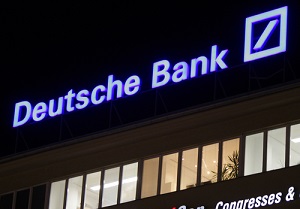I recently said the Brexit vote wasn't so much a "Lehman Brothers moment" as it was a "Bear Stearns moment." Which is to say it was a harbinger, the panic before the calm before the financial apocalypse.
There is a Lehman moment out there on the horizon, though, as sure as there are black swans roaming the Earth.
But you know what they say about black swans. By definition, they're unpredictable. So long as you can see them coming, they're nothing to be scared of... just big, dumb birds.
The good news is, I've got this one dead to rights, although for some it will be a ruinous "unpredictable event." The trouble is coming from a bank, one of the world's biggest (and most dangerous).
So I'm going to show you what to do to make a killing when it gets here...
This Time, It's Not the Big American Banks
Hard as it may be to believe, the likes of JPMorgan Chase & Co. (NYSE: JPM), Bank of America Corp. (NYSE: BAC), or Citigroup Inc. (NYSE: C), won't be the epicenter of the next crisis, although they certainly won't be immune from contagion effects, either.

The global economic weak link is actually overseas, in (where else?) Europe.
Like I said, this event could erupt at one of the two most irreparably insolvent Italian banks, like Unicredit SpA, or Banca Monte dei Paschi di Siena SpA. The world's oldest operating bank has such a "mountain" of bad loans that it just assigned a team of 700 finance pros to deal exclusively with those books.
There are quite a few United Kingdom-based banks in sad shape, too, like Lloyds Banking Group, or Royal Bank of Scotland Plc. They're overexposed to an extremely iffy, bubbly UK property market that's not likely to survive the aftermath of Brexit. Not for nothing has short interest in RBS shares grown by 123%.
If you only listen to the yes-men speaking on behalf of the European Central Bank (ECB) or the Bank of England, you might think that things aren't all that bad, but a look at their actual balance sheets tells a different, horrible story.
That's a story that was ugly before, but here in the post-Brexit world, things are even worse.
You see, shares of European banks were getting pounded before the Brexit vote. Across the board their share prices were down about 20% from the start of 2016 to June 23, the voting date.
They're down another 20% now. And for good reason.
The old story is that European banks didn't repair their busted balance sheets after the 2008 financial crisis and the subsequent Great Recession. They kept a lot of bad loans on their books and managed to meet increasingly stringent capital requirements and regulatory pressures by simply juggling how they accounted for the risks on their books and how they measured their capital.
In short, European banks, because of the links between them and the craziness that passes for monetary policy in their common market, all fell victim to the fantasy that economic growth would eventually generate revenue and profits enough to offset write-downs of their hefty non-performing loans (NPLs).
Well, the continent never got the growth it needed, of course. Even after the ECB fired every round in its bazooka, nothing changed for the better for any of the banks.
Now the British are going their own way, which means exiting the ECB. That takes Europe's second-largest economic power out of the pool of central bank backers. Now the weight of the ECB's grossly inflated balance sheet - heading towards $5 trillion or more - will be spread among fewer and weaker countries.
Italian banks look like they are on the front line. And, to be sure, they are. They have almost $396 billion of non-performing loans on their books. Forget whatever technical, "official" definition bankers have for NPLs. The final, brutal truth is no one is going to get paid back.
If the ECB doesn't rescue teetering Italian banks, if the European Union doesn't come to their aide, if Italy isn't allowed to throw an immediate $40 billion at them, in fact, if all of the above doesn't happen, Italian banks are going down, which will be a Lehman moment.
But it's worse than you think. In fact it's about 100 times worse, according to Italian Prime Minister Matteo Renzi.
When he said that, though, he was not actually talking about Italian banks - he was talking about one bank, Germany's biggest bank...
[mmpazkzone name="in-story" network="9794" site="307044" id="137008" type="4"]
He was talking about Deutsche Bank AG (NYSE: DB), the most dangerous bank in the world.
Yes, a single bank. Kind of like Lehman Brothers was a single bank.
There Are Anywhere from 49 to 54 Trillion Reasons to Worry
This whole time, Germany's been telling Italy to rein in its bad banks because the Germans don't want the European Central Bank (which is to say German taxpayers) bailing out Italian banks.
Prime Minister Renzi simply pointed out the fact that Deutsche Bank is technically insolvent, so how dare the Germans lecture him?
The truth is, he's absolutely right.
Germany is Europe's largest economy, and Deutsche Bank lends to every giant German company. The bank's representatives amount to about 30% of board members of Germany's biggest companies. They are all married, come hell or high water.
 Deutsche Bank is for all intents and purposes probably technically insolvent. But of course it is "too big to fail," so every single lie listed in the Big Banksters' Little Golden Book of Outrageous Lies has been frog marched through the media cycle to try and prove otherwise.
Deutsche Bank is for all intents and purposes probably technically insolvent. But of course it is "too big to fail," so every single lie listed in the Big Banksters' Little Golden Book of Outrageous Lies has been frog marched through the media cycle to try and prove otherwise.
Forget about losses at Deutsche Bank... Forget about its faked-up capital... Forget about the bad loans on its books - forget about all of that.
Because it's child's play. Small potatoes.
The real bad news is Deutsche Bank is sitting on somewhere between $49 and $55 trillion worth of derivatives trades. That's trillion-with-a-T, not billions.
On the high side, that's close to 20 times the size of Germany's economy, and almost four times the GDP of the entire Eurozone.
If Deutsche Bank isn't propped up and it has to unwind its derivatives trades, all its counter-parties to all those derivatives trades are going to crack one way or another.
All of them.
And that would make the 2008 financial crisis look like a day at the beach, like Lehman Brothers times 10.
But don't worry - you'll get through the crisis in style with some or all of these moves I'm recommending.
What to Buy the Minute Deutsche Bank Explodes
What we have to watch is the European Union's stance on Italian banks. If there isn't going to be unanimous consent on bailing them out, and soon, the ECB may not have the political juice to act to save the banks.
It's all about politics now - the politics of a disrupted and divided continent, no less.
I'm going to be watching the goings-on at Deutsche Bank like a hawk, because if the "Lehman alarm" starts ringing, we won't have much time to react.
Here's what I suggest at the first sign of panic:
Get really short on European banks, either through short selling or buying puts on iShares MSCI Europe Financial Sector Index Fund (Nasdaq: EUFN). My Short-Side Fortunes readers made more than 200% and more than 400% in a matter of days when European financials swooned right after the Brexit. Any sign of Deutsche Bank's collapse could bring in even more, even faster.
Short the euro against the U.S. dollar, big time, with the ProShares Ultra Short Euro ETF (NYSE Arca: EUO). This leveraged exchange-traded fund will return twice the euro's daily decline (or lose twice the euro's daily advance) against the dollar. It'd be worth it to maintain a speculative position here until the bomb goes off (and you get paid off) or Deutsche Bank averts disaster, at which point you should unload these shares.
Get set to profit on plunging European stocks by shorting or buying puts on the Vanguard FTSE Europe ETF (NYSE Arca: VGK), which tracks the Developed Europe All-Cap Index. This is some seriously broad exposure to Europe, and when Deutsche Bank goes off a cliff, it will lead European stocks along for the ride.
Short German big caps with short selling or puts on the iShares MSCI Germany ETF (NYSE Arca: EWG) and then start thinking about shorting Japanese stocks the same way with iShares JPX-Nikkei 400 (NYSE Arca: JPXN). Make no mistake, Japan will be up next to walk the plank.
And then buy U.S. Treasuries. That might seem counterintuitive at first, but there will be a typical "flight to quality" when panic sets in.
But the real reason to buy U.S. bonds (and lots of them) is because the Fed will flood U.S. banks with liquidity and embark on an instant negative-interest-rate policy, which will mean bond prices go stratospheric.
That's why you'll want to own them - not for their negative yields.
If this all passes, and it still could, we'll have dodged the financial equivalent of the asteroid that killed the dinosaurs.
But it's not over till it's over.
Those negative yields Shah mentioned are going to be a big opportunity, too. Click here for his latest investor briefing on the negative-interest-rate policy and how to make extra cash when the Fed pulls the trigger on this disaster. You'll also get Shah's Insights & Indictments research twice each week, free of charge.
Follow Shah on Facebook and Twitter.
About the Author
Shah Gilani boasts a financial pedigree unlike any other. He ran his first hedge fund in 1982 from his seat on the floor of the Chicago Board of Options Exchange. When options on the Standard & Poor's 100 began trading on March 11, 1983, Shah worked in "the pit" as a market maker.
The work he did laid the foundation for what would later become the VIX - to this day one of the most widely used indicators worldwide. After leaving Chicago to run the futures and options division of the British banking giant Lloyd's TSB, Shah moved up to Roosevelt & Cross Inc., an old-line New York boutique firm. There he originated and ran a packaged fixed-income trading desk, and established that company's "listed" and OTC trading desks.
Shah founded a second hedge fund in 1999, which he ran until 2003.
Shah's vast network of contacts includes the biggest players on Wall Street and in international finance. These contacts give him the real story - when others only get what the investment banks want them to see.
Today, as editor of Hyperdrive Portfolio, Shah presents his legion of subscribers with massive profit opportunities that result from paradigm shifts in the way we work, play, and live.
Shah is a frequent guest on CNBC, Forbes, and MarketWatch, and you can catch him every week on Fox Business's Varney & Co.



